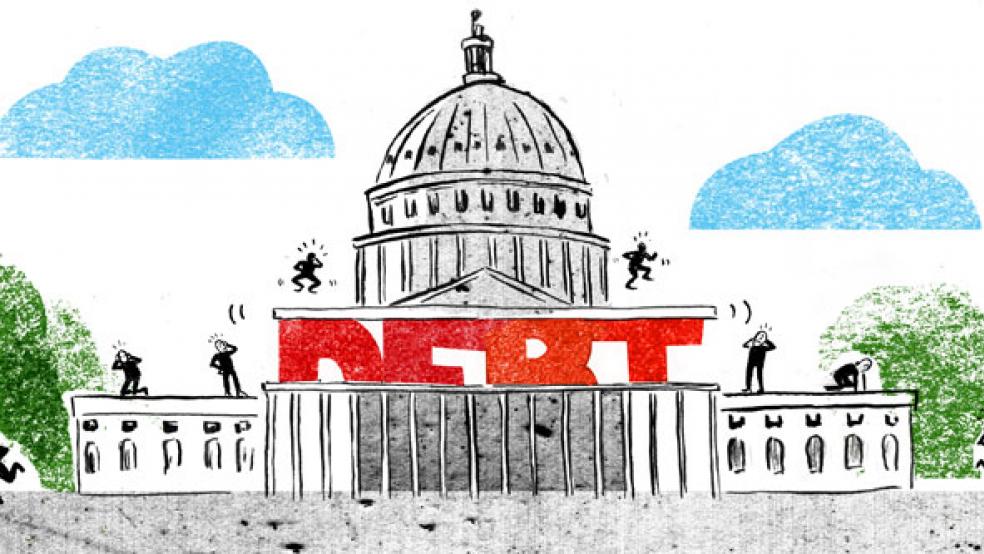It’s not as though Congress needs any more drama right now. Facing battles over tax and health care reform, and the president’s contentious 2018 budget proposal, lawmakers have more than enough to fill up their leisurely legislative calendar between now and when they take the entire month of August off.
Yesterday, though, they received some unwelcome news from White House Office of Management and Budget Director Mick Mulvaney who told them that the federal debt limit, previously thought to be an issue that could be postponed to the fall, may need to be raised prior to the August recess.
Related: Trump Budget Finds $0 in Wasteful Pentagon Programs. Are They Kidding?
“My understanding is that the receipts currently are coming in a little bit slower than expected,” Mulvaney told the House Budget Committee on Wednesday, adding that he believes the Treasury Department may soon need to move up the date on which it expects that it will no longer be able to pay the nation’s bills.
The Treasury reached the debt limit in March this year and has been employing what are referred to -- somewhat absurdly at this point given the frequency with which they are employed -- “extraordinary measures” to avoid taking on additional debt. This means delaying certain payments and extending a federal I.O.U. to government agencies that can wait to receive some of their funding.
Until yesterday, it was generally assumed that the Treasury would be able to manage under current debt restrictions until October or even November. But Mulvaney’s plea to lawmakers in his testimony was to raise the debt limit before they leave town for more than five weeks at the end of July.
In separate testimony before the House Ways and Means Committee on Wednesday, Treasury Secretary Steven Mnuchin also stressed the need for speedy action. “I urge you to raise the debt limit before you leave for the summer,” he told lawmakers.
Related: Treasury Secretary Gets Grilled on Trump's Budget 'Draft'
Mnuchin went further, though, pressing House Republicans on the need to pass a “clean” debt ceiling bill, meaning one that is free of riders or other legislative language not directly related to the amount of debt the Treasury can legally incur.
That, of course, is the tricky part.
Debt ceiling crises, as the nation has been made painfully aware over the past decade, create the kind of legislative choke-point greatly prized by the more extreme elements of the Republican Congress. Even more than failure to pass spending bills, which can force a government shutdown, failure to raise the debt ceiling on time can have enormous consequences, up to and including a catastrophic default on the financial obligations of the federal government.
That gives extraordinary leverage to lawmakers willing to play chicken with fiscal disaster. Ironically, one of the men warning Congress yesterday about the need to increase the debt limit used to be among them. As a member of Congress representing South Carolina, Mulvaney voted four times not to raise the nation’s borrowing limit. At one point in 2011, he was asked what he thought would happen if the country defaulted on its debt.
Related: 9 Top Takeaways From Trump’s $4 Trillion Federal Budget
“Well, I don’t know,” he said, accusing economists who warned that it would be disastrous of “just guessing.” He then went ahead and voted against raising the borrowing limit anyway.
Mulvaney wasn’t so flippant about the subject yesterday, but many of his former colleagues are still willing to stand in the way of a debt limit increase if they aren’t rewarded for their support, usually with spending cuts that target programs they dislike.
Late Wednesday, the House Freedom Caucus, of which Mulvaney was a member, released a statement categorically opposing a clean debt ceiling increase.
“We oppose any clean raising of the debt ceiling, we call for the debt ceiling to be addressed by Congress prior to the August Recess, and we demand that any increase in the debt ceiling be paired with policy that addresses Washington’s unsustainable spending by cutting where necessary, capping where able, and working to balance in the near future,” it said.
Related: Why Trump's Tax Cuts May Not Spur a Corporate Spending Boom
This puts the leadership of the House of Representatives in a familiar dilemma. They can oblige the Freedom Caucus by adding cuts or other restrictions that satisfy the chamber’s most conservative members. But if they do that and the bill moves on to the Senate, it could well face a Democratic filibuster -- one bolstered by the fact that even the Republican Trump administration opposed the addition of extraneous requirements to the debt limit increase.
The alternative is to work with House Democrats to pass a bipartisan debt limit increase. House Minority Leader Steny Hoyer on Tuesday said that his party would be willing to work with Republicans to pass a clean increase. But if House leaders take that path, they will come under fire for cooperating with Democrats to raise government spending and expand the national debt, three things that are still anathema to many of their voters.
It’s a decision to Republicans would surely have preferred to postpone to September or later, but it looks as though Washington’s long, hot summer is about to get even more uncomfortable.





